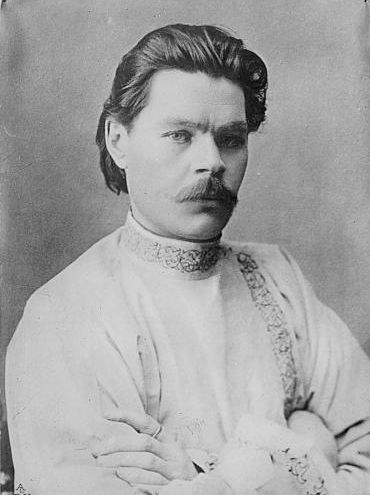Maxim GorkyAlexander Peshkov (later known as Maxim Gorky was born in Nizhny Novgorod on 16th March, 1868. His father was a shipping agent but he died when Gorky was only five years old. His mother remarried and Gorky was brought up by his grandmother.
Gorky left home in 1879 and went to live in a small village in Kazan and worked as a baker. At this time radical groups such as the Land and Liberty group sent people into rural areas to educate the peasants. Gorky attended these meetings and it was during this period that Gorky read the works of Nikolai Chernyshevsky, Peter Lavrov , Alexander Herzen, Karl Marx and George Plekhanov. Gorky became a Marxist but he was later to say that was largely because of the teachings of the village baker, Vasilii Semenov.
In 1887 Gorky witnessed a Pogrom in Nizhny Novgorod. Deeply shocked by what he saw, Gorky became a life-long opponent of racism. Gorky worked with the Liberation of Labour group and in October, 1889 was arrested and accused of spreading revolutionary propaganda. He was later released because they did not have enough evidence to gain a conviction. However, the Okhrana decided to keep him under police surveillance.
Osip Volzhanin met Gorky in 1889: "He was tall, stooped, dressed in a coat-like jacket and high polished boots. His face was ordinary, plebeian, with a homely duck-like nose. By his appearance he could easily have been taken for a worker or a craftsman. The young man sat on the window sill, and swinging his long legs, spoke strongly emphasizing the letter 'O'. We listened with great delight to his stories, though Somov, an implacable 'political', disapproved of the stories and the behaviour of the young man. In his opinion, the latter occupied himself with trifles."
In 1891 Gorky moved to Tiflis where he found employment as a painter in a railway yard. The following year his first short-story, Makar Chudra, appeared in the Tiflis newspaper, Kavkaz. He story appeared under the name Maxim Gorky (Maxim the Bitter). The story was popular with the readers and soon others began appearing in other journals such as the successful Russian Wealth.
Gorky also began writing articles on politics and literature for newspapers. In 1895 he began writing a daily column under the heading, By the Way. In this articles he campaigned against the eviction of peasants from their land and the persecution of trade unionists in Russia. He also criticized the country's poor educational standards, the government's treatment of the Jewish community and the growth in foreign investment in Russia.
Read more:
http://www.spartacus.schoolnet.co.uk/RUSgorky.htm




